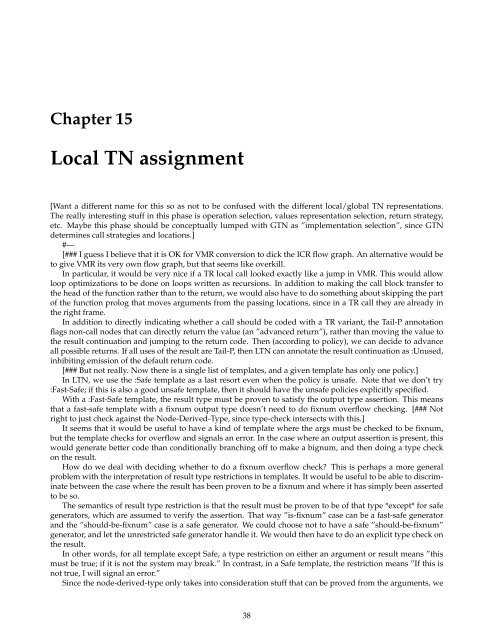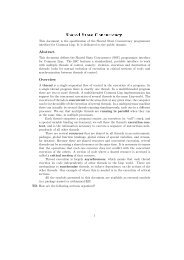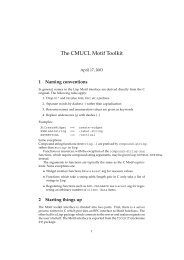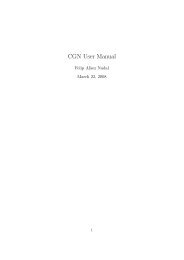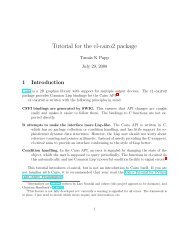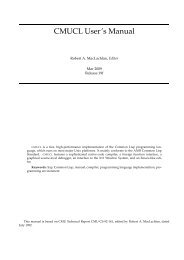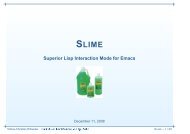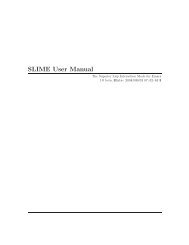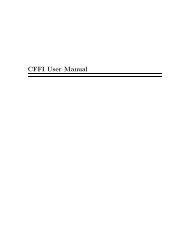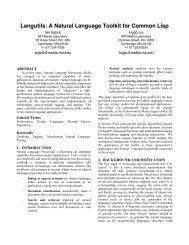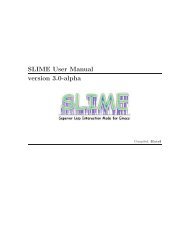Design of CMU Common Lisp.pdf - Common Lisp.net
Design of CMU Common Lisp.pdf - Common Lisp.net
Design of CMU Common Lisp.pdf - Common Lisp.net
Create successful ePaper yourself
Turn your PDF publications into a flip-book with our unique Google optimized e-Paper software.
Chapter 15<br />
Local TN assignment<br />
[Want a different name for this so as not to be confused with the different local/global TN representations.<br />
The really interesting stuff in this phase is operation selection, values representation selection, return strategy,<br />
etc. Maybe this phase should be conceptually lumped with GTN as ”implementation selection”, since GTN<br />
determines call strategies and locations.]<br />
#—<br />
[### I guess I believe that it is OK for VMR conversion to dick the ICR flow graph. An alternative would be<br />
to give VMR its very own flow graph, but that seems like overkill.<br />
In particular, it would be very nice if a TR local call looked exactly like a jump in VMR. This would allow<br />
loop optimizations to be done on loops written as recursions. In addition to making the call block transfer to<br />
the head <strong>of</strong> the function rather than to the return, we would also have to do something about skipping the part<br />
<strong>of</strong> the function prolog that moves arguments from the passing locations, since in a TR call they are already in<br />
the right frame.<br />
In addition to directly indicating whether a call should be coded with a TR variant, the Tail-P annotation<br />
flags non-call nodes that can directly return the value (an ”advanced return”), rather than moving the value to<br />
the result continuation and jumping to the return code. Then (according to policy), we can decide to advance<br />
all possible returns. If all uses <strong>of</strong> the result are Tail-P, then LTN can annotate the result continuation as :Unused,<br />
inhibiting emission <strong>of</strong> the default return code.<br />
[### But not really. Now there is a single list <strong>of</strong> templates, and a given template has only one policy.]<br />
In LTN, we use the :Safe template as a last resort even when the policy is unsafe. Note that we don’t try<br />
:Fast-Safe; if this is also a good unsafe template, then it should have the unsafe policies explicitly specified.<br />
With a :Fast-Safe template, the result type must be proven to satisfy the output type assertion. This means<br />
that a fast-safe template with a fixnum output type doesn’t need to do fixnum overflow checking. [### Not<br />
right to just check against the Node-Derived-Type, since type-check intersects with this.]<br />
It seems that it would be useful to have a kind <strong>of</strong> template where the args must be checked to be fixnum,<br />
but the template checks for overflow and signals an error. In the case where an output assertion is present, this<br />
would generate better code than conditionally branching <strong>of</strong>f to make a bignum, and then doing a type check<br />
on the result.<br />
How do we deal with deciding whether to do a fixnum overflow check? This is perhaps a more general<br />
problem with the interpretation <strong>of</strong> result type restrictions in templates. It would be useful to be able to discriminate<br />
between the case where the result has been proven to be a fixnum and where it has simply been asserted<br />
to be so.<br />
The semantics <strong>of</strong> result type restriction is that the result must be proven to be <strong>of</strong> that type *except* for safe<br />
generators, which are assumed to verify the assertion. That way ”is-fixnum” case can be a fast-safe generator<br />
and the ”should-be-fixnum” case is a safe generator. We could choose not to have a safe ”should-be-fixnum”<br />
generator, and let the unrestricted safe generator handle it. We would then have to do an explicit type check on<br />
the result.<br />
In other words, for all template except Safe, a type restriction on either an argument or result means ”this<br />
must be true; if it is not the system may break.” In contrast, in a Safe template, the restriction means ”If this is<br />
not true, I will signal an error.”<br />
Since the node-derived-type only takes into consideration stuff that can be proved from the arguments, we<br />
38


